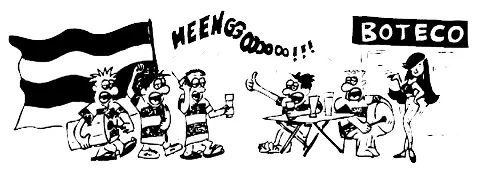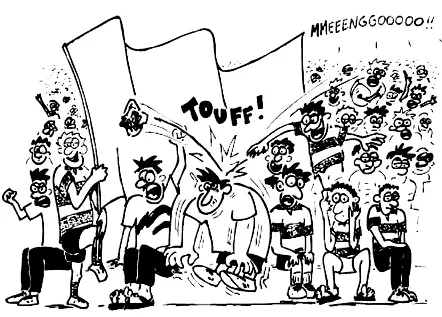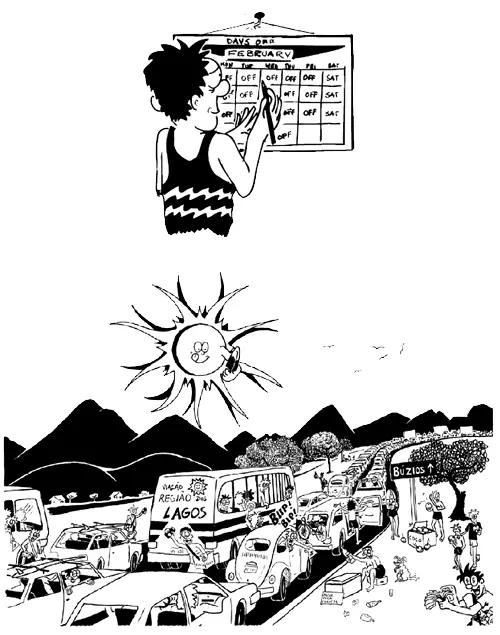A real Carioca, come flood or famine, will never miss seeing his team play at Maracanã. Although it was a team from São Paulo who, by some fluke, won the inaugural game in 1950, the first goal was scored by a Carioca, thus confirming Cariocan supremacy on the field.

Before leaving for the stadium, meet your galera de futebol(your soccer fan buddies) at a botecofor a few choppiuhos. Be sure that everyone is wearing a team shirt, and don’t forget your radinho[ha ’gee nyoo] (the cheapest radio available) and some sort of drum substitute, if not the real thing.
Whether taking the bus or driving (take the car least likely to be stolen), be sure to intimidate any rival fans along the way by waving flags, shirts, or banners out the window while chanting your team’s name. If you are a Flamenguista, for example, chant:
«Meeeeeeen-gooooooo, Meeeeeeen-gooooooo» [Maaaaaayn-goooooow, Maaaaaaavn-goooooow]
Make your way through the traffic and the crowds to the stadium. If you boast of a stomach lined with lead, stop at one of the «foot-long hot dog» stands before entering the stadium gate. And don’t forget the onion and tomato sauce!
Once inside the stadium, a real Carioca futebolfan will only sit in the arquibancada(bleachers) where chaos is at its maximum. Having located a place to sit and are settled, be sure to behave in the following fashion (a real Carioca futebolfan would):
Start a batucadaby banging on your drums or on the seats surrounding your seat;
Drink choppsfrom the mobile vendors;
Demoralize the referee’s mother and the rest of his family;
Bounce your smashed chopppaper cup, as hard as you can, off the head of the person seated in front of you, then pretend it came from the seats behind yours;
Continuously chant your team’s name.
Obs.: Beware of cups filled with bodily fluids projected from the seats directly above yours.
Acceptable conduct during the game:If your team should score a goal, work yourself into a frenzy by jumping and screaming, and then hug the stranger jumping up and down next to you. Maintain this euphoria for a minimum of five minutes. Then continue to give your team incentive throughout the game by conducting yourself in the rowdiest manner possible.
In the unfortunate event the opposing team should score a goal against your team, your entire section of the arquibancadawill fall into five minutes of stunned silence. At this point, resist the temptation to abandon the game. Simply lean over to the person seated closest to you and place the blame for your team’s poor performance on the following:
• the current political crisis,
• the trading of Brazil’s best players to European teams,
• the bicheiros, and, of course
• the coach. And be sure to let the coach know what you think of him by chanting:
«viado viado viado»[vee ’yah doo vee ’yah doo vee ’yah doo]
It goes without being said that he should be fired on the spot, and then be sent to São Paulo as a trainer for one of the Paulistateams.

2x0[doysh ah ’zeh rroo]: In the event your team is clearly headed for disaster, take off your shirt, slip out the side door quietly in order to avoid the traffic, and take an alternative route to the nearest botecofor a few chopps. There is nothing more humiliating for a defeated Carioca futebolfan than to be jeered and mocked in Maracanã traffic by the triumphant fans of the winning team.
If your team is victorious, wrap yourself up in your flag, take advantage of every opportunity to jeer and mock the defeated fans, and head straight to the nearest botecofor a few chopps.
Lesson 21
Holidays and the Four-Day Weekend

Granted, there are a lot of national holidays in Brazil with all the saints to honor and what not. In an effort not to short change Brazilians when it comes to their holidays, the federal government has passed many laws over the years declaring when national holidays should be celebrated. To give you an idea, the following law (verbatim) was decreed a few years back establishing the correct manner in which to observe official holidays:
…Holidays will be observed on the previous Monday when they fall on the other days of the week. This also applies to holidays falling on Saturdays or Sundays. If the holiday occurs on Election Day, it will not be anticipated for another day. In case there is more than one holiday in the same week, the latter will be observed on Monday of the following week. If by any chance there is already a holiday in the following week, it will be observed on Monday, while the previous holiday will be celebrated on Tuesday.
But, like many laws, they are short lived, and so was this one. Regardless, Cariocas love holidays and take them very seriously. So seriously, in fact, that they feel obliged to extend them to the maximum, even when it infringes on the work week. After all, even the Carioca is entitled to determine his own personal priorities. The following are a few of the parameters established by true Cariocas when planning for a feriadão[feh rree yah ’down] (long weekend):
If a holiday falls on a Tuesday or a Thursday, it is automatically a four-day weekend: if it’s a Thursday, it will begin at noon on the previous Wednesday, and if it’s a Tuesday, it will end at noon on the following Wednesday (to accommodate for traffic problems).
If a holiday falls on a Wednesday, you are looking at a five-day weekend, with the potential for a nine-day weekend.
The end of the year holiday — beginning on Christmas Eve at noon — will last until the Monday following Easter. (Nothing really happens at the office between Christmas and Easter, and with the New Year’s, Rio’s patron saint São Sebastiao’s birthday, and Carnival holidays in between, why even make the effort to go to work?)
With schools closed and the children making their trips to Disney World, taking July off is completely acceptable.
Rationalizing that by showing up for work on one hundred and fifty-three days out of a possible three hundred and three he is clearly doing more than his share for the country’s economy, the true Carioca considers this to be a perfectly reasonable schedule.
Note: Every four years, when Brazil plays in the World Cup Soccer Tournament, the number of required work days is directly reduced in proportion to the team’s performance.

Lesson 22
No Sun? No Sweat!

Although the Carioca would rather not admit it, the sun doesn’t always shine in the Cidade Maravilhosa. If you should find yourself in Rio on one of those rare rainy days,don’t despair. The following are a just a few of the many activities that Cariocas will indulge in to pass the time until the sun breaks through, and they can get back to the beach:
Читать дальше

















